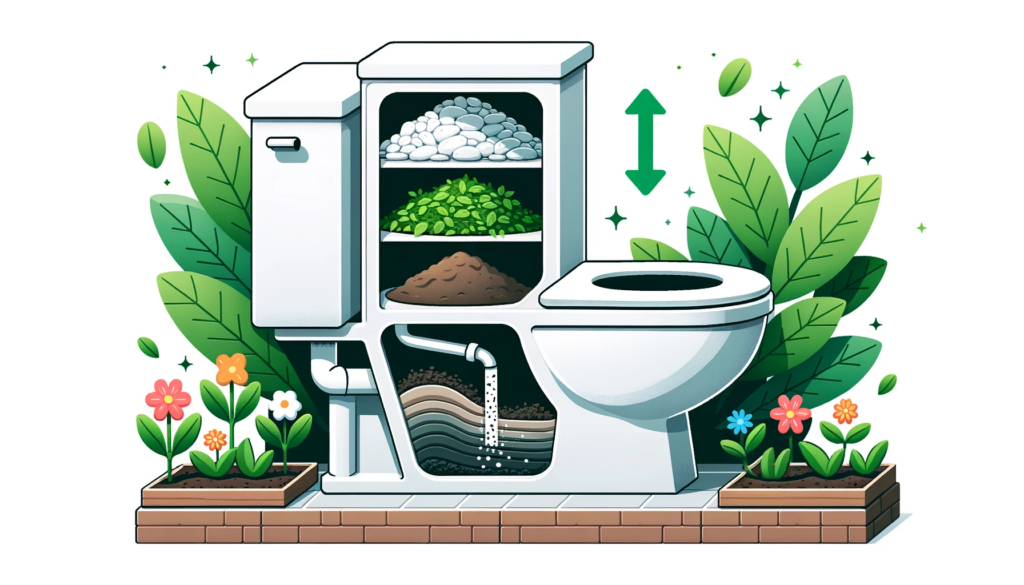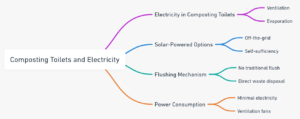
Composting toilets are an eco-friendly alternative to traditional flush toilets, especially popular in off-grid living situations, RVs, and tiny homes. One of the most common questions about these toilets is, how do you empty a composting toilet? The short answer is: with care and following specific steps to ensure hygiene and safety.
[toc]
Key Takeaways
- Composting toilets are sustainable and water-saving.
- Emptying them involves specific steps to ensure safety and hygiene.
- Composting toilets turn waste into usable compost over time.
- Proper maintenance ensures the longevity and efficiency of the toilet.
The Basics of Composting Toilets
What is a Composting Toilet?
A composting toilet is a type of toilet that uses the natural decomposition process to turn human waste into compost-like material. Unlike traditional toilets, they don’t use water for flushing, making them an excellent choice for water conservation.
How Does It Work?
The primary principle behind a composting toilet is decomposition. When you use the toilet, the solid and liquid wastes are separated. The solid waste goes into a chamber where it’s broken down by aerobic bacteria. This process transforms the waste into a compost-like material, which is safe and can be used as a soil additive.
Emptying the Composting Toilet
When to Empty?
The frequency of emptying a composting toilet varies based on its usage and design. Generally, for a full-time user, the solid waste compartment might need emptying every 2-4 weeks. However, it’s essential to check the level regularly and empty it when it’s about two-thirds full.
Steps to Empty
- Prepare: Wear gloves and a mask for hygiene. Ensure you have a compostable bag or container ready.
- Open the Compartment: Access the solid waste compartment of the toilet.
- Remove the Compost: Carefully transfer the composted material into your container or bag.
- Dispose or Use: Depending on how well it’s composted, you can either add it to a compost pile, use it in non-edible gardens, or dispose of it as per local regulations.
- Clean and Reset: Clean the compartment with a natural cleaner, let it dry, and then add a layer of bulking material like sawdust or coconut coir to restart the composting process.

Safety Tips
- Always wear gloves and a mask.
- Do not use the compost for edible plants unless it’s been thoroughly composted for a long time.
- Wash your hands thoroughly after the process.
Advantages of Composting Toilets
- Water Conservation: They don’t use water, saving thousands of gallons annually.
- Eco-friendly: By not using water and turning waste into compost, they reduce the carbon footprint.
- Cost-Efficient: No water bills and minimal maintenance costs.
Analogies and Metaphors
Analogy: Think of a composting toilet as a mini garden inside your bathroom. Just as you’d remove overgrown plants or fallen leaves in a garden, you need to empty the composting toilet when it’s full.
Metaphor: A composting toilet is like a recycling plant. Instead of discarding waste, it transforms it into something useful.
Visual Representations
To better understand the concept, here are some diagrams:
- Factors Influencing Composting: View Diagram
- Use Case of Composting Toilets in Tiny Homes: View Diagram
- Data Flow in a Composting Toilet: View Diagram
Watch Video: Emptying Nature’s Head Composting Toilet
Related Keywords
how often do you empty a composting toilet: Depending on usage, you might need to empty the solid waste every 2-4 weeks.
how to empty a composting toilet: Follow the steps mentioned above, to ensure safety and hygiene.
where do you empty a composting toilet: You can add it to a compost pile, use it in non-edible gardens, or dispose of it as per local regulations.
where to empty composting toilet: Ideally, in a compost pile or as a soil additive in non-edible gardens.
how to empty nature’s head composting toilet: Nature’s Head toilets come with specific instructions, but the general process remains the same.
do you have to empty a composting toilet: Yes, once the solid waste compartment is about two-thirds full.
Remember, composting toilets are a sustainable solution, but they require regular maintenance and care. Proper emptying ensures they function efficiently and remain odor-free.



